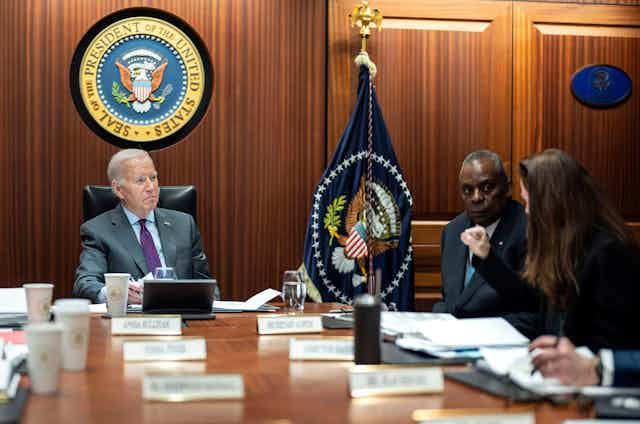The recent drone attack that killed three US soldiers has placed Joe Biden’s handling of the conflict in the Middle East under renewed scrutiny. Under pressure from critics demanding a hard-hitting response, the president has vowed to “hold all those responsible to account”.
But using force in an election year is fraught with political risk.
Recent polls suggests the US public is divided about the Gaza conflict. According to a poll last month, 39% of voters favour a continuation of Israel’s military campaign, while 44% say that Israel should stop to avoid mounting civilian casualties. Another poll suggests that the sympathies of those who voted for Biden in 2020 are evenly split between Israel and the Palestinians.
Crucially, 57% of voters disapprove of the president’s handling of the war. This sentiment is particularly strong among younger voters and Democrats, upon whom Biden’s hopes for reelection may depend.
Biden’s Republican opponents have also lined up to lambast him. Donald Trump, who looks all but certain to secure his party’s nomination for November’s presidential election, attributed the recent attack to Biden’s “weakness and surrender” while Nikki Haley, Trump’s only remaining Republican challenger, suggested that the US should “go after” Iran’s military leaders.
Facing criticism on all sides, the ideal solution for Biden is likely to be one that satisfies public demands to “do something” without alienating his base or provoking a widening of the war.
Balancing risks
Biden’s challenge is a familiar one. As I show in my recent book, presidents throughout history have taken political considerations into account when making decisions about war and peace. As both commander-in-chief and holder of the highest elected US office, presidents must balance the competing interests of national security and political survival.
Usually, that results in a degree of caution. Since voters bear the brunt of the human and financial costs of war, they tend not to reward incumbents who recklessly engage in conflict. So presidents have good political reasons to think twice before putting troops in harm’s way. As former president George W. Bush once joked to troops in the Middle East: “You don’t run for office in a democracy and say, ‘Please vote for me, I promise you war.’”
But the strength of this kind of democratic constraint can vary across contexts and over time. Mounting casualties tend to erode support for lengthy commitments, but shocking events or provocations like those that took place over the weekend can also lead to a public demand for retribution.
Lessons from history
We have been here before. Almost exactly four years ago, Trump authorised the assassination of Qasem Soleimani, a senior Iranian military commander, apparently motivated in part by a desire to appear tough in an election year. Trump then decided to de-escalate, declining to respond militarily for attacks on bases housing US troops in Iraq. It was a sign that his appetite for a direct conflict with Iran was moderated by similar political realities that now face his successor.
Trump’s recent criticism of Biden’s policies – including his claim on social media that “this attack would NEVER have happened if I was president, not even a chance” – conveniently fails to mention this. But it is the kind of counterfactual criticism that candidates who are challenging an incumbent have often tended to embrace, safe in the knowledge that they won’t be held accountable for delivering on policies that may prove unwise or unworkable. At least, not until after the election.

Elsewhere, my research indicates that these dynamics also featured during previous conflicts involving the US. During the war in Iraq, for example, the administrations of both Bush and Obama grew increasingly anxious about additional or extended troop deployments as elections loomed.
More broadly, several studies find that leaders facing reelection tend to be more conflict-averse, entering fewer wars in the months before an election than during other parts of their tenure.
Ending endless wars?
Whether or not a lasting diplomatic solution to the crisis in Gaza can be found remains to be seen. But from a wider perspective, the genie may already be out of the bottle. It is only a few short months since the US national security advisor, Jake Sullivan, triumphantly declared that “the Middle East region is quieter today than it has been in two decades”.
On Monday, by contrast, secretary of state Antony Blinken warned that the Middle East faces its most “dangerous” situation since at least 1973.
These rhetorical gymnastics reflect a fast-moving strategic reality. But they also render hollow the political promises of successive presidents – including Biden – to bring an end to the era of major military operations in the wider region.
The reality is that many of the forces deployed to the region during the fight against the Islamic State never left. The US still has thousands of troops stationed in Iraq, Syria and Jordan. It is these forces that have been subject to periodic attacks from Iranian proxies. Over 150 such attacks have taken place since October 7.
Coupled with the joint US-UK airstrikes against Houthi targets in Yemen, the promised response to last weekend’s attack indicates we may be entering the latest instalment of the “endless wars” from which Biden had hoped to move on. The episode therefore raises questions about the scope of the broader US military commitment in the Middle East – and whether either candidate is prepared to make clear the real strategic trade-offs implied in their promises.
In the meantime, we can be sure of one thing: war is very much on the ballot in November’s presidential election.

